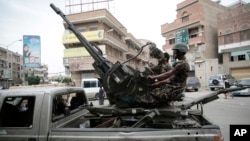Kuwait, which is hosting peace talks between Yemen's Sunni government and Shi'ite rebels, said Saturday that stalemated negotiations had been extended to August 7 at the request of a top U.N. peace envoy.
The announcement came hours after the Yemeni government said it was withdrawing from the monthslong talks, which have stalled over recent attempts by Houthi rebels to legitimize their gains in the embattled country.
Houthi leaders who back former President Ali Abdullah Saleh said Thursday that they were forming a coalition administration.
A spokesman for U.N. Secretary-General Ban Ki-moon immediately criticized the Houthi move, saying the Houthis' "unilateral decision was not in line with the peace process, and endangered substantial progress" made during the Kuwait talks.
The six-nation Gulf Cooperation Council and ambassadors from 18 other nations supporting Yemeni peace efforts endorsed the continuation of the Kuwait talks and condemned the Houthis' announcement that they were forming a "supreme political council."
Envoy offers plan
The agreement to extend talks until August 7 capped a day in which U.N. peace envoy Ismail Ould Cheikh Ahmed, who requested the extension, offered what he described as a framework for a solution to nearly two years of fighting between government forces and the Iran-backed rebels. He did not offer details.
The U.N. sponsored two rounds of peace talks last year — neither successful — but those efforts collapsed in December under the weight of an outbreak of fierce fighting. Fighting has slowed since the Kuwait talks resumed in April.
The government of President Abdu Rabu Mansour Hadi has demanded that rebels withdraw from all territories gained since conflict erupted in September 2014, when Houthi fighters seized the capital, Sana'a, after years of complaints about alleged discrimination against them by the government.
Monitors say at least 6,500 people have been killed during the past two years, including more than 3,200 civilians.
A Houthi offensive in southern Yemen temporarily gave the rebels control of the port of Aden and sent Hadi into months of exile in neighboring Saudi Arabia. The Saudis responded by forming a regional coalition of Sunni governments, which last year began launching airstrikes in defense of Hadi's presidency.





